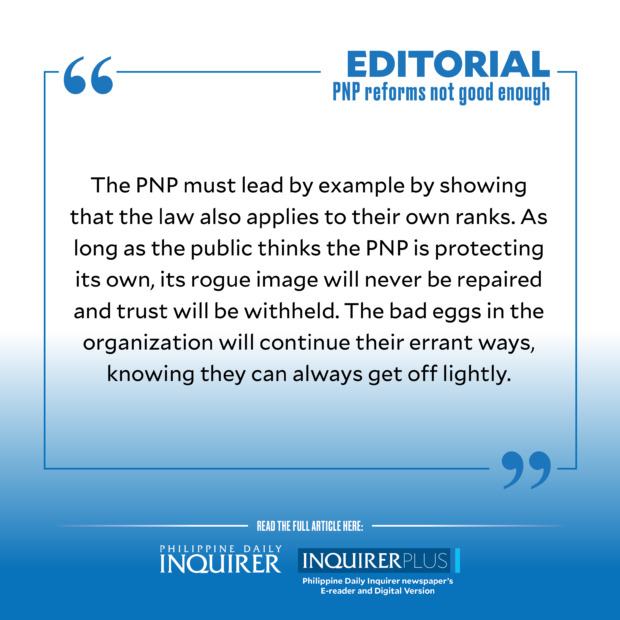PNP reforms not good enough
 The horrific killing of Kian delos Santos, 17; Carl Arnaiz, 19, and Reynaldo “Kulot” de Guzman, 14, seems to be from a distant past, better forgotten for the sheer brutality of police forces descending on poor communities to pursue the Duterte administration’s war on drugs.
The horrific killing of Kian delos Santos, 17; Carl Arnaiz, 19, and Reynaldo “Kulot” de Guzman, 14, seems to be from a distant past, better forgotten for the sheer brutality of police forces descending on poor communities to pursue the Duterte administration’s war on drugs.
After all, the new government has spurned the bloody approach to combatting illegal drugs, which President Marcos admitted had given rise to human rights violations. Henceforth, he said, government will focus on prevention and the rehabilitation of drug users while continuing operations against drug syndicates plying the nefarious trade.
But six years of a merciless campaign that stacked up a bone-chilling death toll—between 6,000 and 30,000—which was encouraged by rhetoric from the Chief Executive no less, has apparently normalized unprovoked killing among trigger-happy elements of the Philippine National Police that they simply could not stop the habit.
How else explain the unnecessary killing of Jerhode “Jemboy” Baltazar, by six Navotas policemen last Aug. 2? Jemboy was not even a drug or crime suspect; like Kian, he just happened to be at the wrong place at the wrong time. Like Kian, Jemboy lost his life in a shoot-first-ask-questions-later police operation—a case of mistaken identity that should not have happened had police followed basic protocols.
Jemboy and a friend were on their boat preparing to go fishing when the Navotas cops, acting on information that a murder suspect was “hiding in a boat,” chanced upon them and immediately started shooting. Jemboy’s friend, who survived, said the cops continued shooting even as they tried to surrender, prompting Jemboy to jump into the water. But the cops continued shooting at him as he went under, hitting him in the face and killing him.
The police even tried to twist the story, claiming that the 17-year-old, who was shirtless and wearing shorts at the time, had a concealed gun, a version of the “nanlaban” (shoot-out) scenario they often used during the drug war.
The PNP should be commended for acting swiftly on this latest tragic killing by promptly apprehending the cops and filing charges against them. But the charge of reckless imprudence resulting in homicide adds insult to injury. Why the light charge when no number of excuses could justify the deliberate use of lethal force based on faulty or even incomplete information? This is beyond reckless: it is a manifestation of the culture of violence, corruption, and abuse of power that has poisoned the ranks of law enforcers mandated to “serve and protect” the people.
Recently, policemen figured in the looting of a retired teacher’s house in Imus, Cavite, and robbery during an illegal gambling operation in Sampaloc, Manila. A case of corruption cascading to the lower ranks? Recall that Interior Secretary Benjamin “Benhur” Abalos Jr. had asked for the mass resignation of nearly a thousand police officers to rid the organization of generals involved in protecting the illegal drug trade, with 18 high-ranking police officers recently named and dismissed from service.
While six years of the Duterte administration calcified the culture of violence among cops, with the former president egging them on and vowing to protect them, the image of these law enforcers as “kotong” (extortion) cops has always been a problem.
The PNP leadership’s current reform measures to cleanse the organization are obviously not enough, given the repeated incidents of police brutality, so-called lapses in judgment, violations of procedures, and rampant corruption. Abalos is on the right track by moving to widen and enforce accountability for these fatal lapses. But the PNP leadership should assume greater responsibility to inculcate into police personnel the very basic value of respect for human lives. It begins with the recruitment and training process, and the necessary tests to ensure that applicants are psychologically fit for the job.
The PNP’s system of exacting accountability needs a reboot as well. The move to relieve erring cops or put them into floating status seems to be a calculated act to lull the public into thinking that the culprits are being dealt with. In reality, these cops are merely transferred to other units, or ostensibly given retraining. This is not enough as repeated cases of impunity have illustrated. There should be administrative penalties commensurate to their offenses, and charges in court if so warranted.
The PNP must lead by example by showing that the law also applies to their own ranks. As long as the public thinks the PNP is protecting its own, its rogue image will never be repaired and trust will be withheld. The bad eggs in the organization will continue their errant ways, knowing they can always get off lightly. In the case of Jemboy, slapping the six Navotas cops with the lightest of charges sends the disturbing message that being poor, his life amounts to so little.




















